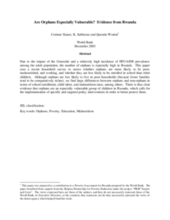Due to the impact of the Genocide and a relatively high incidence of HIV/AIDS prevalence among the adult population, the number of orphans is especially high in Rwanda. This paper uses a recent household survey to assess whether orphans are more likely to be poor, malnourished, and working, and whether they are less likely to be enrolled in school than other children. Although orphans are less likely to live in poor households (because foster families tend to be comparatively richer), we find large differences between orphans and non-orphans in terms of school enrollment, child labor, and malnutrition rates, among others. There is thus clear evidence that orphans are an especially vulnerable group of children in Rwanda, which calls for the implementation of specific and targeted policy interventions in order to better protect them.
©The World Bank

